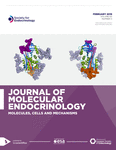Progranulin induces adipose insulin resistance and autophagic imbalance via TNFR1 in mice
- The First Affiliated Hospital of Medical School of Xi'an Jiaotong University, 277 West Yanta Road, Xi'an, Shaanxi, China 710061
- Correspondence should be addressed to H Sun or S Wu; Email: shufangw{at}hotmail.com or sunhongzhi{at}mail.xjtu.edu.cn
Abstract
Progranulin (PGRN) has recently emerged as an important regulator for insulin resistance. However, the direct effect of PGRN in vivo and the underlying role of progranulin in adipose insulin resistance involving the autophagy mechanism is not fully understood. In this study, mice treated with PGRN for 21 days exhibited the impaired glucose tolerance and insulin sensitivity, remarkable adipose autophagy as well as attenuated insulin signaling via inhibition of mammalian target of rapamycin (mTOR) pathway. Furthermore, blockade of tumor necrosis factor receptor 1 (TNFR1) by TNFR1BP-Fc injection resulted in the restoration of impaired insulin sensitivity and insulin signaling induced by PGRN. Consistent with these findings in vivo, PGRN treatment induced defective insulin signaling, abnormal autophagic and mitochondrial activity in cultured adipocytes, while such effects were nullified by the blockade of TNFR1. In addition, PGRN-deficient adipocytes were more refractory to tunicamycin- or dexamethasone-induced insulin resistance, indicating the causative role of the TNFR1 pathway in the action of PGRN. Collectively, our findings support the notion that PGRN is a key regulator of insulin resistance and that PGRN may mediate its effects, at least in part, by inducing autophagy via the TNFR1-dependent mechanism.
- Revision received 12 September 2015
- Accepted 14 September 2015
- Made available online as an Accepted Preprint 15 September 2015
- © 2015 Society for Endocrinology











